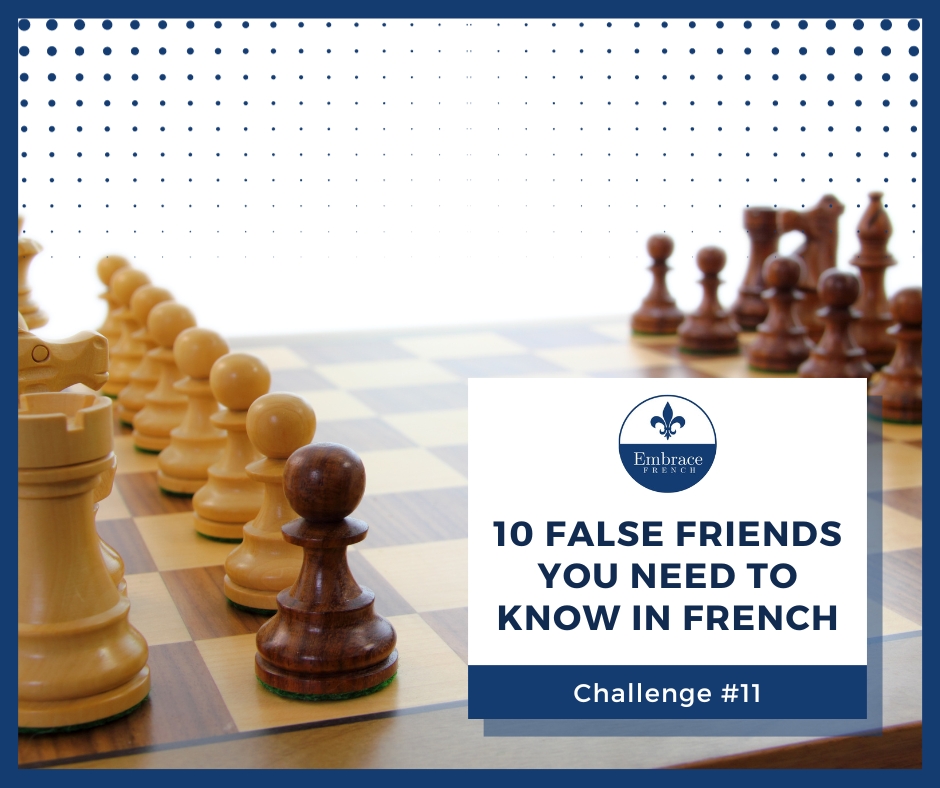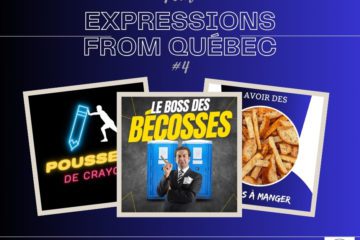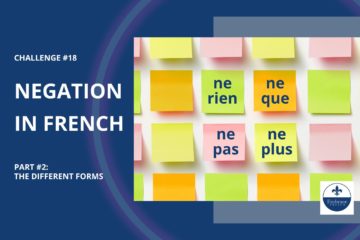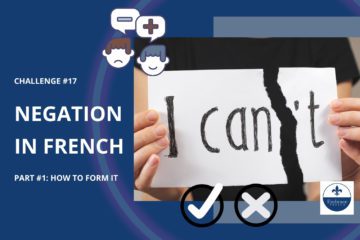10 False Friends You Need to Know in French
CHALLENGE #11

Ha! Les faux amis (false friends)! It’s a subject I love! Firstly, because when I teach French, it’s always amusing because my classes are the perfect place to practice and learn without offending anyone. However, it’s essential to recognize and master the faux amis (false friends), because what’s hilarious in my class can quickly become uncomfortable in, say, a job interview.
Over the years, I’ve read a ton of articles on false friends and, although they were all very well done, some of them seemed more like archaeological digs or an attempt to revive dead languages (e.g. Latin) as the explanations went so far back in time.
It was very interesting for history geeks like me, but that’s not what I want to do here. My aim is to make it easier for you to learn French by explaining all the complex aspects of the language in the simplest way possible. In other words, I want you to be able to express yourself and communicate in French; not to be able to analyze every word in the dictionary. 😉
What are « false friends » (faux amis)?
A false friend in French is a word that closely resembles a word in English; so much so that its sound and spelling lead us to believe that we can trust it and apply the same meaning as the English word. But that’s a trap!
As you know, all nations are in constant contact with other nations and other languages, which means that languages evolve, and certain words are borrowed or deviated from other languages. And that’s how false friends are created.
Here are 10 essential false friends you need to know in French.
#1 To Attend ≠ Attends
To attend = Assister
« To attend » in French means « assister à un événement » or « être présent à quelque chose ».
EN: Students from all over the world come to attend the prestigious university.
FR: Des étudiants du monde entier viennent étudier dans cette prestigieuse université.
EN: It’s essential to attend important meetings to stay informed about company updates.
FR: Il est essentiel d’assister aux réunions importantes pour rester informé des nouveautés de l’entreprise.
Attends = Wait
“Attends” in French is « you wait » in the imperative form (an order).
FR: Attends-moi à la porte, s’il-te-plaît.
EN: Wait for me at the door, please.
FR: Attends ton tour dans la file d’attente.
EN: Wait for your turn in the line.
#2 Actually ≠ Actuellement
Actually = en réalité
« Actually » means “en réalité” (in reality) or “en fait” (in fact).
EN: I thought he was joking, but actually, he was serious about the proposal.
FR: Je pensais qu’il plaisantait, mais en fait, il était sérieux au sujet de la proposition.
EN: She wanted to clarify that, actually, there was a misunderstanding.
FR: Elle tenait à préciser qu’il s’agissait en fait d’un malentendu.
Actuellement = currently
“Actuellement” in French means currently or at the moment.
FR: Actuellement, je travaille sur un projet très stressant.
EN: I’m currently working on a very stressful project.
FR: Je suis actuellement en train de lire un livre passionnant.
EN: I am currently reading a fascinating book.
#3 Affair ≠ Affaire
An affair = Une liaison amoureuse
« An affair » in French translates as a “liaison” or “relation amoureuse secrète” (secret love affair or relationship). The term “aventure” (adventure) is also often used in French.
EN: The scandalous revelation of an extramarital affair shocked the public.
FR: La révélation scandaleuse d’une liaison extraconjugale a choqué l’opinion publique.
EN: Despite their attempts to keep it a secret, their passionate affair became the talk of the town.
FR: Malgré leurs efforts pour garder le secret, leur liaison passionnée est devenue le sujet de conversation de la ville.
Une affaire = A thing
When we speak of “une affaire” in French, we’re simply referring to a thing or a subject.
FR: Une affaire importante a été discutée lors de la réunion d’entreprise.
EN: An important matter was discussed at the company meeting.
FR: C’est une affaire délicate qui nécessite une approche prudente.
EN: It’s a delicate matter that calls for a cautious approach.
Faire affaire = To do business
The expression « faire affaire » or » faire des affaires » means to do business, to work and/or engage in professional transactions.
FR: Mon entreprise fait affaire avec ce fournisseur depuis plus de dix ans.
EN: My company has been doing business with this supplier for over ten years.
FR: Nous allons à cette rencontre dans le but de signer un partenariat d’affaire avec cette entreprise manufacturière.
EN: We are going to this meeting with the aim of signing a business partnership with this manufacturing company.
#4 To Pass an Exam ≠ Passer un examen
To pass an exam = réussir un examen
« To pass an exam » can be translated into French as “réussir un examen”, to obtain a passing grade.
EN: Studying consistently is the key to passing any challenging exam.
FR: Étudier régulièrement est la clé de la réussite de tout examen difficile.
EN: She was thrilled to pass an exam she had been preparing for months.
FR: Elle était ravie de réussir un examen qu’elle préparait depuis des mois.
Passer un examen = to take a test
“Passer un examen” in French simply means answering the exam questions, without necessarily indicating the exam result.
FR: Elle était nerveuse à l’idée de passer son premier examen universitaire, mais elle s’est bien débrouillée.
EN: She was nervous about taking her first university exam, but she did well.
FR: Passer un examen médical régulièrement est essentiel pour prévenir d’éventuels problèmes de santé.
EN: Regular medical check-ups are essential to prevent potential health problems.
#5 Rendezvous ≠ Rendez-vous
Here, we are talking about the same word. The meanings are similar, but not identical. In French, Rendez-vous is used for any type of planned meeting. The best English translation would be Appointment.
In English, the word rendezvous is used as a category of appointments; it often refers to formal or romantic encounters.
Rendezvous = rencontre formelle ou romantique
EN: They scheduled a romantic rendezvous at their favorite restaurant.
FR: Ils ont prévu un rendez-vous romantique dans leur restaurant préféré.
EN: A business rendezvous was arranged to discuss potential collaborations.
FR: Une réunion d’affaires a été organisée pour discuter des collaborations potentielles.
Rendez-vous = appointment
FR: Nous avons un rendez-vous chez le médecin cet après-midi.
EN: We have a doctor’s appointment this afternoon.
FR: Mon ami m’a donné rendez-vous au café du coin.
EN: My friend asked me to meet him at the nearby café.
#6 Medicine ≠ La médecine
Medicine = médicament
The word « medicine » refers to “médicaments” (drugs) or “remèdes” (remedies) taken to cure aches and diseases.
EN: Prescription medicine is often necessary to treat certain health conditions.
FR: Les médicaments sur ordonnance sont souvent nécessaires pour traiter certains problèmes de santé.
EN: Natural remedies are sometimes preferred over conventional medicine.
FR: Les remèdes naturels sont parfois préférés à la médication conventionnelle.
La médecine = The medical field
In French, the word “médecine” is broader, encompassing the entire medical discipline.
FR: La médecine traditionnelle a ses propres méthodes de traitement.
EN: Traditional medical practices have their own methods of treatment.
FR: Il étudie la médecine pour devenir médecin.
EN: He studied medicine to become a doctor.
#7 A location ≠ la location
A location = un emplacement
The English word « location » translates into French as “emplacement” or “localisation” and refers to a specific place.
EN: The film crew chose a picturesque location for the movie shoot.
FR: L’équipe du tournage a choisi un emplacement pittoresque pour le tournage du film.
EN: Finding the perfect location for the event took weeks of careful consideration.
FR: Il a fallu des semaines de réflexion pour trouver l’endroit idéal pour l’événement.
Une location = A rental
In French, “une location” refers to the rental of an asset such as a car or an apartment.
FR: Nous avons trouvé une location de vacances près de la plage.
EN: We found a vacation rental near the beach.
FR: La location d’une voiture est nécessaire pour parcourir le Québec.
EN: A rental car is a must for exploring Quebec.
#8 To demand ≠ Demander
To demand = Exiger
The verb « to demand » translates into « exiger” in French.
EN: The workers are on strike because they demand better working conditions and fair wages.
FR: Les travailleurs sont en grève parce qu’ils exigent de meilleures conditions de travail et des salaires plus équitables.
EN: As a customer, you have the right to demand quality products and services.
FR: En tant que client, vous avez le droit d’exiger des produits et des services de qualité.
Demander = To ask
“Demander” in French simply means to ask a question or find out about something.
FR: Il a dû demander l’aide de ses collègues pour terminer le projet.
EN: He had to ask his colleagues for help to complete the project.
FR: Vous pouvez toujours demander des informations à la réception.
EN: You can always ask for information at the front desk.
#9 A habit ≠ Un habit
A Habit = Une habitude
In English, « habit » generally means “habitude” in French, something you do on a regular, routine basis.
EN: Exercising daily is a healthy habit that can improve your overall well-being.
FR: Faire de l’exercice quotidiennement est une habitude saine qui peut améliorer votre bien-être général.
EN: Breaking a bad habit requires determination and consistent effort.
FR: Se défaire d’une mauvaise habitude demande de la détermination et des efforts constants.
Un habit = clothing
The French word “habit” generally means a clothing item or outfit.
FR: Son habit traditionnel reflète l’héritage culturel de sa région d’origine.
EN: His traditional outfit reflects the cultural heritage of his native region.
FR: En hiver, il aime porter un habit chaud et confortable pour affronter le froid.
EN: In winter, he likes to wear warm, comfortable clothes to face the cold.
#10 Money ≠ Monnaie
Money = Argent
The best way to translate the word « money » is with the term « argent ». So, depending on the context, the French word “argent” means either money or silver (the precious metal).
EN: She always keeps a little extra money in her wallet for emergencies.
FR: Elle garde toujours un peu d’argent dans son portefeuille pour les cas d’urgence.
EN: Investing wisely is crucial to grow your money over time.
FR: Il est essentiel d’investir judicieusement pour faire fructifier votre argent au fil du temps.
Monnaie = Change
When we speak of “monnaie” in French, we often refer to change or to coins. In Quebec, these range from $0.05 to $2. The term “monnaie” can also be used to refer to a country’s currency.
FR: Il a fouillé dans ses poches et a trouvé 5$ en monnaie.
EN: He looked in his pockets and found $5 in change.
FR: La monnaie européenne, l’euro, est utilisée par de nombreux pays de l’Union européenne.
EN: The European currency, the euro, is used by many European Union countries.
How can I avoid false friends?
No matter what language you are learning, there always comes a time when, in order to make progress, you have to jump in, take chances and make sentences as best you can. So, unfortunately, it’s impossible never to fall into the trap of false friends. However, I can tell you how to prevent them from causing you embarrassing moments.
So when you are having a formal conversation, interviewing for a new job, negotiating business deals, opening an account at the bank, etc., never take chances. Never assume that a word means the same thing as the word it sounds like in English.
Use your French lessons, discussions with very good friends or online translators to risk words and/or expressions. In French we say « C’est en forgeant qu’on devient forgeron », in other words, practice makes perfect. While I encourage you to try to converse in French whenever you get the chance, there are situations where we only have one chance to make a good impression.
If, despite everything, you find yourself in a situation where you notice a change in the other person’s facial expression and attitude, take a moment and ask in a light tone « Did I say something wrong? ».
There’s no need to be embarrassed! With your accent, the other person will understand that you are learning French and will explain your misunderstanding, probably even a bit amused.
Your challenge: Practicing online
Did you know that the Government of Canada has a whole section of its website dedicated to practicing French? It’s called the Linguistic Portal of Canada, and offers a wide range of resources, including quizzes on grammar and syntax, anglicisms, spelling, writing rules, vocabulary and general culture. I invite you to take the two quizzes on false friends and discover new ones by clicking here: https://www.noslangues-ourlanguages.gc.ca/fr/quiz/jeu-quiz-faux-amis-fra
Have you downloaded your free guidebook package?

You can now download a free learning package on the 20 most commonly used verbs in French, conjugated in the present tense. This set includes an ebook with all the verbs and a sentence for each person (je, tu, il, elle, nous, vous, ils, elles), an Excel file to add all the concepts from the ebook to your flashcards application and a video where you can hear me pronounce these verbs and sentences. And it’s free! Download it now!


